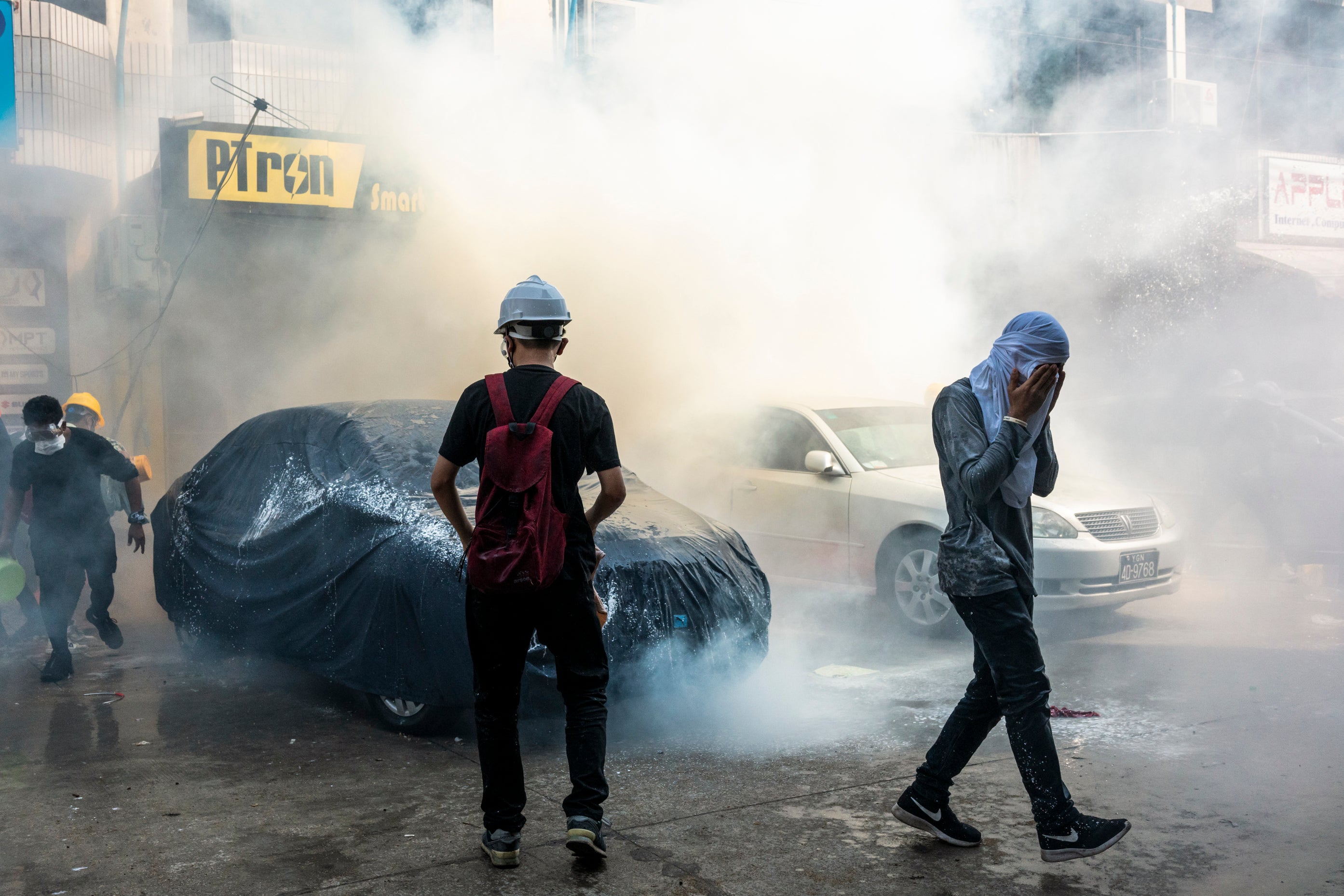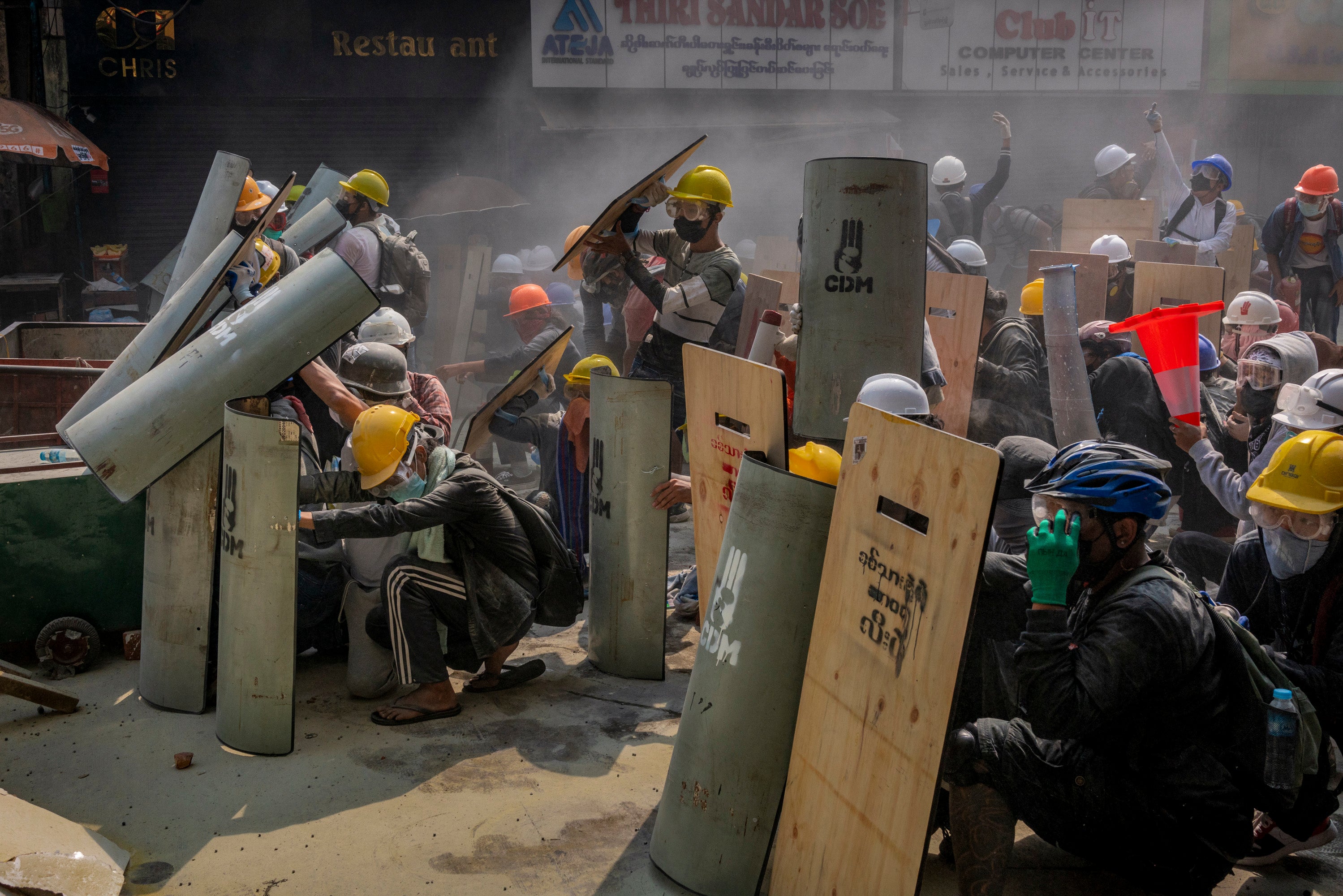‘Terrible and unacceptable’: People in Myanmar tell of their fears about a new era of military rule
Following the deaths of 18 people at the hands of police during the latest protests, those living in Yangon tell The Independent about their worries for the future of the country

On the first day of February 2021, Myanmar awoke to an internet blackout: No social media, no apps, no search engines. No news from friends, family or the international community, no way of knowing what was happening. The streets filled as people questioned each other for any information, using walkie-talkies to contact other neighbourhoods to ask for any clues.
Five months of consecutive lockdown because of the coronavirus had seen much of life moving online. Rumours soon spread along lengthening queues gathering outside banks and rice shops: the military had seized power.
On the morning of 1 February, the military overthrew elected members of the National League for Democracy, the party of civilian leader Aung San Suu Kyi, who had won an 80 per cent landslide majority at the November 2020 election after ruling the country since 2015.
Aung San Su Kyi was arrested for alleged possession of “unlawful communication devices” and breach of export laws, while president U Win Myint was held for allegedly breaking Covid-19 restrictions. Neither have been seen since their arrests.
“What is happening is terrible and unacceptable”, says 29-year old NGO worker Nyein. “Burmese people have faced this very situation in the past and we know that the military will just rule the country for their own interests and not for its citizens.” Nyein’s frustration is widely shared among those who remember Myanmar’s most recent history, as well as among the younger generation.
“This is killing the future of our young generation and the developing progress this country has made,” he says. “I could not access any form of qualified education as a teenager.”
Myanmar had been one of the most economically and politically isolated countries in the world during the 26-year-long totalitarian leadership of general U Ne Win, from 1962 to 1988. In addition to the abject poverty, the country has been home to the world’s longest-running civil war, between ethnic groups and the military.
A sense of dread has been rising amongst the population as the unravelling of present events re-echoes memories of the country’s most recent history.
In August 1988, protesters took to the streets across the country in reaction to the dismal living conditions and calling for wider political participation and the start of a democratisation process. At the time, protests were followed by a violent military crackdown that left up to 10,000 dead and civil liberties harshly curtailed for years to come, leaving many no choice but to flee to neighbouring countries.
A week after the February coup, the streets filled with protesters led by the Civil Disobedience Movement (CDM), calling civilians and private sectors to join a union-led strike boycotting all state apparatuses until the release of political prisoners and an end to the military takeover.
To those who have been taking the streets, the memories and experiences of the 1988 generation are a clear warning not to return to an era that became infamous around the world for its brutal massacres and suppression of pro-democracy stances.
Mi Hong, a young restaurant owner originally from the ethnic Mon State, was forced to flee to neighbouring Thailand due to the stagnant economy and the post-1988 repression by state security forces, the Tatmadaw.
The partial democratisation that followed the 2015 elections brought with it not only international investment but also a return of citizens who were ready to reinvest in their country.
With the opening of economy to the international community, she returned full of hope and optimism to Myanmar. “I came back to my home country and opened a restaurant,” she explains.
The increase of foreign investment generated during the past five years has benefited both the private and public sectors, providing new employment and entrepreneurial opportunities for the younger generations. “With the military’s return I don’t see a future for small businesses in Yangon, as [the military] will once again monopolise all sectors of the economy”.
Democratisation has been a fragile process in Myanmar based on peace processes led by the civilian government, yet it has provided the many ethnicities an opportunity to invest in their country and grow.

Saw Sai, 26, a Kayah migrant working in Yangon, says minorities are represented at the protests. “You can see many ethnic groups protesting differently from political parties, but with bright flags and people wearing clothing representing their own ethnic backgrounds,” he says. “It’s like a sea of colourful flowers are blooming in a big garden.”
“We have been suffering with the civil war for many years and I feel putting an end to it will bring hope, peace and success in the future, especially for our generation.”
During the five-year rule of Suu Kyi’s civilian government streets in Yangon have been coloured with various traditional dress worn by Chin, Kachin, Karen and Shan people, restaurants serving diverse ranges of local foods have been opening side by side.
“As a Chin political activist, when I heard about the coup I felt that the Chin people’s access to self-determination, human rights and education had slipped away” says Lian.
Outside of Yangon, in states and cities far away from the capital, many still struggled under the civilian government.
“If we lose this protest and I don’t get killed or arrested, I will have to become an insurgent for the Chin’s resistance, to protect my people,” he says alluding to the many years of ethnic cleansing suffered by the Chin ethnic minority during Myanmar’s military rule.
Four weeks from the coup, protesters are still flooding the main avenues of Myanmar’s major cities and towns. Yet on the side streets, fear grows when considering the prospects of a failed peaceful uprising.
Night-time raids and arrests by the police forces and military have started taking place, resurfacing a collective awareness of the brutality the Tatmadaw are capable of.
“Back in 1988 I was amongst those who took to the streets,” recalls 57-year-old Daw Win, now a mother of four. “The military repressed the protests by shooting and killing activists. I remember the police shooting a young man who was sitting at a teashop. Soon afterwards I joined a housewife’s movement along with my mother.”
Daw Win has witnessed most of Myanmar’s recent political turbulence. She was 23 years old in 1988. Like others at the time, she joined the protests to participate in changing the country’s future. Now she is now haunted with the idea that her sons will want to follow her example.
The military takeover has mobilised a new generation of activists demanding democratic reform. Protesters in Myanmar are calling for reformation of the government in the name of national unity, rule of law and respect of civil liberties, rather than restoring an illiberal government that known for oppressing civilians and minorities.
Join our commenting forum
Join thought-provoking conversations, follow other Independent readers and see their replies
Comments


Bookmark popover
Removed from bookmarks